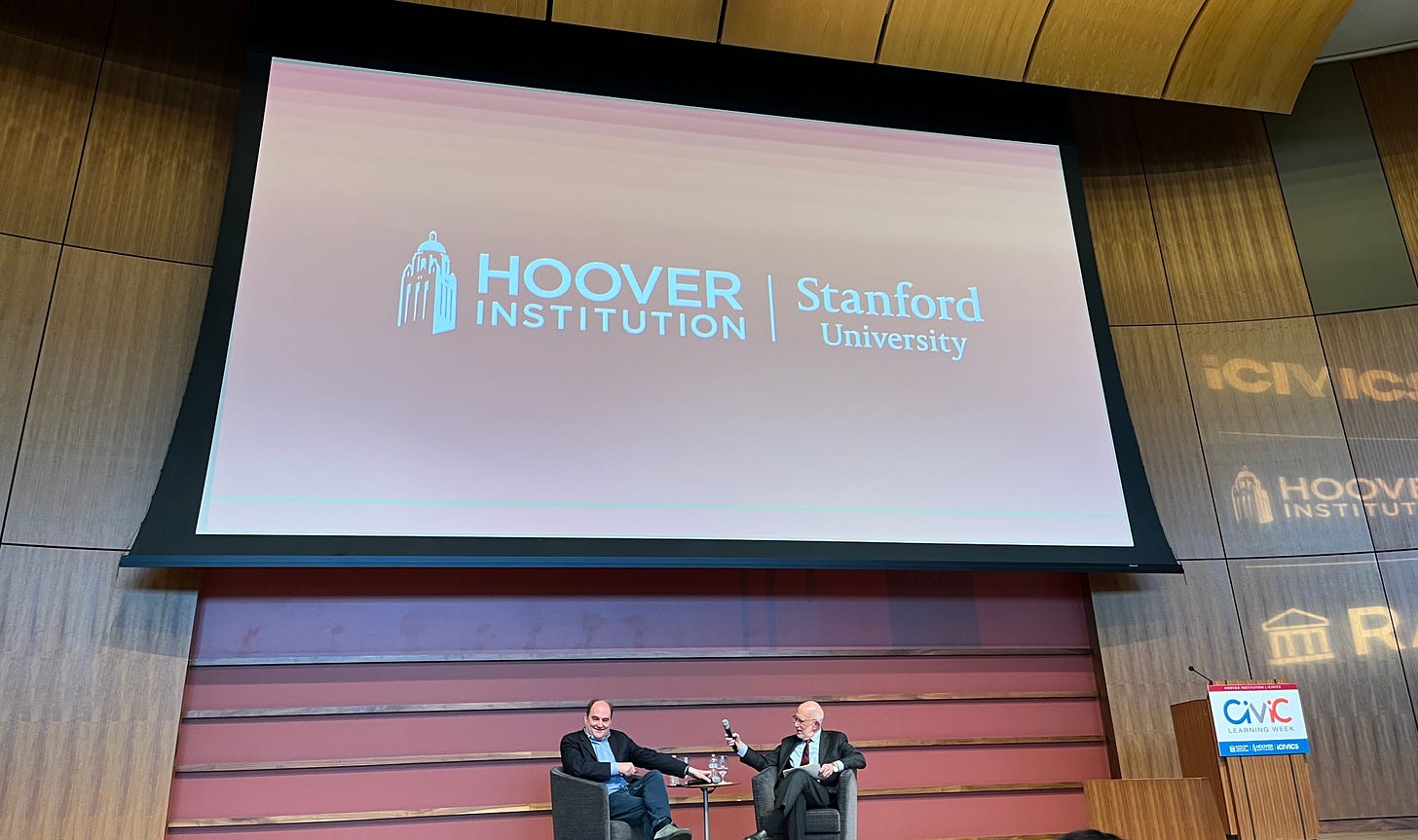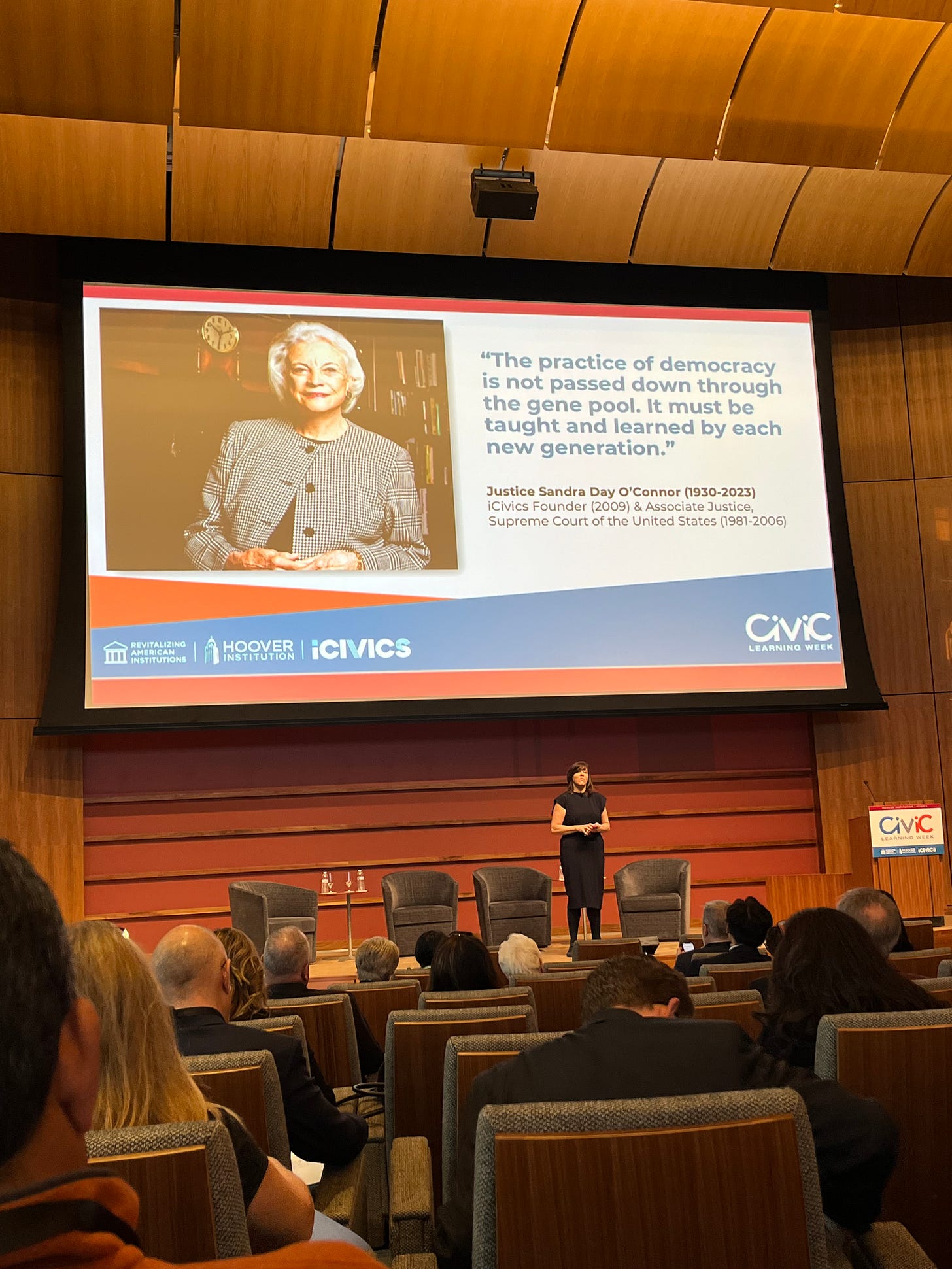In prep for the online show I’m producing and hosting, “From Discord to Harmony: Charting America’s Path to Unity,” I was invited to Civic Learning Week National Forum, hosted by iCivics and Stanford University’s Hoover Institute.
One of the guests of my show, Hans Zeiger, President of the Jack Miller Center invited me. The Jack Miller Center is a national nonprofit network of academic scholars focused on civic education.
My show will have historians explaining how we as a nation became so polarized, civics experts explaining how the government works and what we as citizens can do to make a difference, along with experts that will give tools on how to move forward in this turbulent climate.
What was so refreshing about this event is that everyone from what I can tell was very passionate how being informed about civics can make a difference. I completely agree and is one of the reasons why I’m doing this show.
I have come across too many young people that don’t understand how the government works and if people really read the constitution and if our government officials followed the laws of the constitution, we wouldn’t have that much to worry about.
One surprising thing at this event was the discussion between former Secretary of State Condoleezza Rice and Utah’s Gov. Spencer Cox. I haven’t fallen into the Republican well. My values and principles still aren’t in alignment with there’s, but they weren’t like the MAGA folks. They were very sensible and I also got the feeling that they weren’t too happy with what’s going on in the government currently. I actually felt like I could hang out with them and have a reasonable civil conversation.
There were also some young people, high school and college students that spoke. They were very inspiring. I’m also trying to book some of them for my event. It was great to see people that young civically engaged. It gave hope for the future.
I start interviewing the experts this week. If you have any burning questions, please share and I will try to get them in.
Have a wonderful week!
Best,
Danita










Dan Schnur is a political scientist who (last I checked) teaches at Berkeley, USC, and Pepperdine. He reminds his students to always remember that most Americans do not care about political matters as deeply as they do.
I think we have a twofold problem. The first is, paradoxically, that we have *too much* engagement today. This hyper-informed audience is beyond apoplectic. For years, people complained about low voter turnout. Well, turnout is up. It hasn't made us more civil.
The second problem is that, as Professor Schnur reminds us, everyone else is turned off by politics.
Civic engagement is a tricky thing to get right:
* If you see the outcomes of elections in terms of existential threats to your way of life, you leave yourself very few options when your candidate or your party does not triumph.
* If, on the other hand, you can't be bothered, I sympathize, but you are trading away your voice of reason, and leaving the arena to the hyper-partisan folks you detest.
Our team builds learning games for science, health, STEM, and civics. Occasionally, we run into the criticism that our civics game, Election Lab, is too dispassionate, too cerebral, and fails to tap into the civic issues that matter in elections. One political scientist was outraged that dice had any role in a game about elections.
I try to explain that we are reaching two audiences with our game: first, for the folks who couldn't be bothered, it is a way to show how presidential elections are strategic puzzles, played against a worthy opponent, where the map changes every time. Second, for the very political scientists who object to the role of uncertainty in electoral outcomes: our game models polling, and unlikely outcomes, in a way that is accessible to non-data scientists.
Policy wonks will be eternally frustrated if they learn only policy, and nothing about strategy, because the power to implement good policy comes from successful strategies to win elections.
And for folks who search Google every year for "electoral college" after every presidential election, we can show how campaigns use this electoral college to win, in a way that is fun, engaging, and indelible.